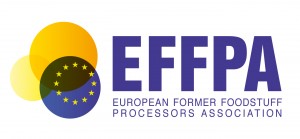The Webinar titled ‘The Role of Food Manufacturers and Retailers in the Processing of Former Foodstuffs’ hosted by EFFPA took place on 6 June with more than fifty attendees from retail, food businesses, associations, as well as EU and national officials. As part of the EU Green Week initiative and the European Year of Skills to contribute to sustainable growth, the webinar aimed at ‘teaching skills’ to food manufacturers and food retailers to facilitate their capacity to make former foodstuffs available for feed production. EFFPA also presented the webinar as part of its activities as co-chair of the EU Food Waste Platform Action & Implementation sub-group, supporting the EU in finding solutions to reach the food waste reductions targets (to be published early July 2023).
The speakers, Didier Jans (AIBI), Els Bedert (EuroCommerce), Jaap van der Kloet (GMP+ International), and EFFPA president Valentina Massa delivered presentations, introducing their respective organisations with emphasis on the link between former foodstuff processors and their supplier industry, in particular retailers and food operators. Raising awareness of former foodstuff processing, explaining the legal feed safety requirements and barriers the speakers aimed at facilitating the food to feed transition. The webinar shed light on the processing of relevant materials – especially bread – not anymore intended for human consumption procured by bakers and retailers. According to AIBI, the Association of International Plant Bakeries, about 75% of bread ‘residual flows’ goes to animal feed which is considered to be the most suitable path. This is reflected in AIBI’s recent attempt to have DG ENERGY to withdraw bakery wastes from Annex IX of Regulation (EC) 2018/2001 on renewable energy production, to prevent financial incentives to drive bakery residues away from the animal feed outlet. EuroCommerce is an important partner in the supply chain, as they are positioned between producers and consumers. This allows for positive influence on food production and distribution, which is especially important concerning selling wholesale and bulk quantities. This also gives responsibility to the retail sector which is, represented by EuroCommerce, engaged in many frameworks to fight food waste in Europe and to further reduce the sectorial waste which currently accounts for 7% of the total food waste in the EU. Several strategies, such as feed milling, insect feeding, or direct use on farms have been presented as a means to valorise food losses.
In their presentation, EFFPA introduced the sector and raised awareness for solutions that former foodstuff processing offers in relation to SDG 12.3 giving emphasis to the relevant legal frameworks, especially Directive 2008/98/EC (including definitions of ‘waste’ and measures by the EU to mitigate waste excluding animal by-products), Regulation (EC) No. 294/2013 (stating health rules regarding animal by-products), and Commission Notice 2018/C 133/02 (which states the guidelines for the feed use of ‘food no longer intended for human consumption’), and which explicitly states that former foodstuffs destined to become feed is indeed not ‘waste’. EFFPA pointed to clarifications made by the European Commission to facilitate the uptake of former foodstuffs in feed, such as the fact a food used by / best before date expiration does not automatically exclude potential feed use.
The GMP+ International presentation stressed the importance of feed safety compliance in Europe ever since the BSE and Dioxin scandals in the 1990s and explained a range of feed safety requirements relevant to food manufacturers and retailers when considering to make former foodstuffs available as feed.
In the Q&A, the organisations pointed to the importance of collaboration and taking responsibility to drive sustainability while respecting all safety principles. Regarding the role of food processors in developing former foodstuff processing, Didier Jans said: ‘Important are the value of the product and the trust between partners […] There are synergies between food and feed hygiene. But they’re not the same. If we want to be successful, we need to manage that.’ Els Bedert added: ‘The key points for success are awareness, knowledge sharing, harmonisation, and identifying the barriers!’
As a direct follow up action, EFFPA also presented the requirements around former foodstuff processing to the Eurocommerce Food Committee on 7 June 2023.
EFFPA Presentation – Valentina Massa Introduction of EFFPA and Former Foodstuff Processing
AIBI Presentation – Didier Jans Co-products circularity in the Bakery industry
EuroCommerce Presentation – Els Bedert Retail and Wholesale continued focus on reducing Food Waste
GMP+ International – Jaap van der Kloet Feed Hygiene & Safety Requirements for Retailers & Food Manufacturers to sell Former Foodstuffs
